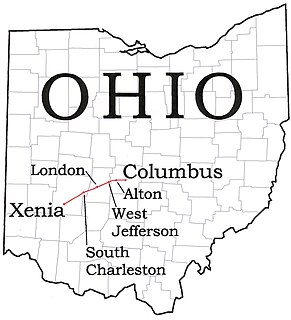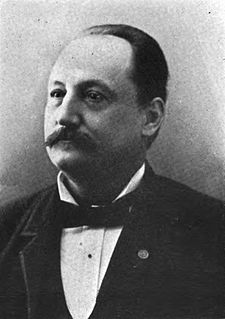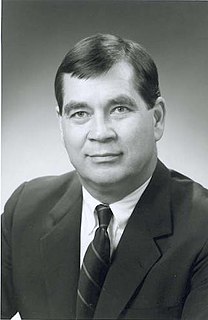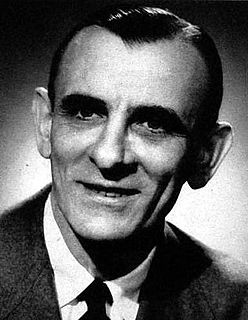
Michael B. Coleman is an American politician of the Democratic Party who served as the 52nd mayor of Columbus, Ohio. He was the first African-American to serve as the mayor of Ohio's capital city.

Green Lawn Cemetery is a historic private cemetery located in Columbus, Ohio in the United States. Organized in 1848 and opened in 1849, the cemetery was the city's premiere burying ground in the 1800s. An American Civil War memorial was erected there in 1891, and chapel constructed in 1902 and expanded in 1963. With 360 acres (150 ha), it is Ohio's second-largest cemetery.

The Columbus and Xenia Railroad was a railroad which connected the city of Columbus, with the town of Xenia in the state of Ohio in the United States. Construction began in October 1847, and the line opened in February 1850. Connecting with the Little Miami Railroad, it created the first rail route from Cincinnati to Columbus.

Samuel Luccock Black was a Democratic politician from the U.S. state of Ohio who served as 32nd Mayor of Columbus, Ohio for one two-year period and was later a judge.

Myron Bierdeman Gessaman was a Republican politician from the U.S. state of Ohio and a veteran of the United States Army during World War I. He served as mayor of Columbus, a prosecutor and judge of Franklin County, and as a member and floor leader of the Ohio House of Representatives.

James John Thomas was a Republican politician from the U.S. state of Ohio. He was the 40th mayor of Columbus, Ohio and the 36th person to serve in that office. He was elected on Tuesday, November 4, 1919 and defeated incumbent Democratic mayor George J. Karb. He served Columbus immediately after World War I and throughout the 1920s.

Charles Anson Bond was the 37th mayor of Columbus, Ohio and the 34th person to serve in that office. He was elected on November 5, 1907 and served Columbus for one term. The campaign was one of the dirtiest in Columbus history, and two weeks after winning the election, Bond's wife Blanche Hull Bond died in childbirth. As a result, he was at a disadvantage when he took the oath of office, and only mounted a half-hearted re-election campaign in 1909. He was defeated in the 1909 mayoral election by George S. Marshall.

Philip H. Bruck was the 29th mayor of Columbus, Ohio and the 26th person to serve in that office. He served Columbus for two consecutive terms. His successor, George J. Karb, took office in 1897. He died in 1920.

The Columbus mayoral election of 1905 was the 55th mayoral election in Columbus, Ohio. Incumbent Republican mayor Robert H. Jeffrey retired from office after one term. Democratic party nominee De Witt C. Badger defeated Republican party nominee Winfield Scott Potter.

The Columbus mayoral election of 1899 was the 52nd mayoral election in Columbus, Ohio. It was held on Monday, April 3, 1899. Democratic party incumbent mayor Samuel L. Black was defeated by Republican party nominee Samuel J. Swartz.
The Columbus mayoral election of 1999 was the 81st mayoral election in Columbus, Ohio. It was held on Tuesday, November 2, 1999. Republican party incumbent mayor Greg Lashutka retired from office after two consecutive terms in office. Democratic party nominee Michael B. Coleman defeated Republican party nominee Dorothy Teater. Coleman became the first African American elected as mayor of Ohio's capital city.

The Columbus mayoral election of 1991 was the 79th mayoral election in Columbus, Ohio. It was held on Tuesday, November 5, 1991. Republican party incumbent mayor Buck Rinehart retired from office after serving two consecutive terms. Republican party nominee Greg Lashutka defeated Democratic party nominee Ben Espy.

The Columbus mayoral election of 1971 was the 74th mayoral election in Columbus, Ohio. It was held on Tuesday, November 2, 1971. Incumbent Democratic mayor Jack Sensenbrenner was defeated by Republican party nominee Tom Moody.

The Columbus mayoral election of 1963 was the 72nd mayoral election in Columbus, Ohio. It was held on Tuesday, November 5, 1963. Incumbent Republican mayor Ralston Westlake was defeated by Democratic party nominee and former mayor Jack Sensenbrenner.

The Columbus mayoral election of 1967 was the 73rd mayoral election in Columbus, Ohio. During the primary nomination on May 2, 1967, the Columbus electorate nominated Republican Jerry Spears, Jr., a businessman from the Hilltop neighborhood, and incumbent Democratic mayor Jack Sensenbrenner to compete in the mayoral election. On Tuesday, November 7, 1967, mayor Jack Sensenbrenner defeated Jerry Spears, Jr.

The Columbus mayoral election of 1975 was the 75th mayoral election in Columbus, Ohio. It was held on Tuesday, November 4, 1975. Democratic party nominee John Rosemond was defeated by incumbent Republican mayor Tom Moody.

The 2015 Columbus mayoral election took place on November 3, 2015, to elect the Mayor of Columbus, Ohio. The election was officially nonpartisan, with the top two candidates from the May 5 primary advancing to the general election, regardless of party.

Andrew James Ginther is a Democratic politician, the 53rd mayor of Columbus, Ohio, and the 48th person to serve in that office. He served as President of Columbus City Council from 2011 until 2015.



















